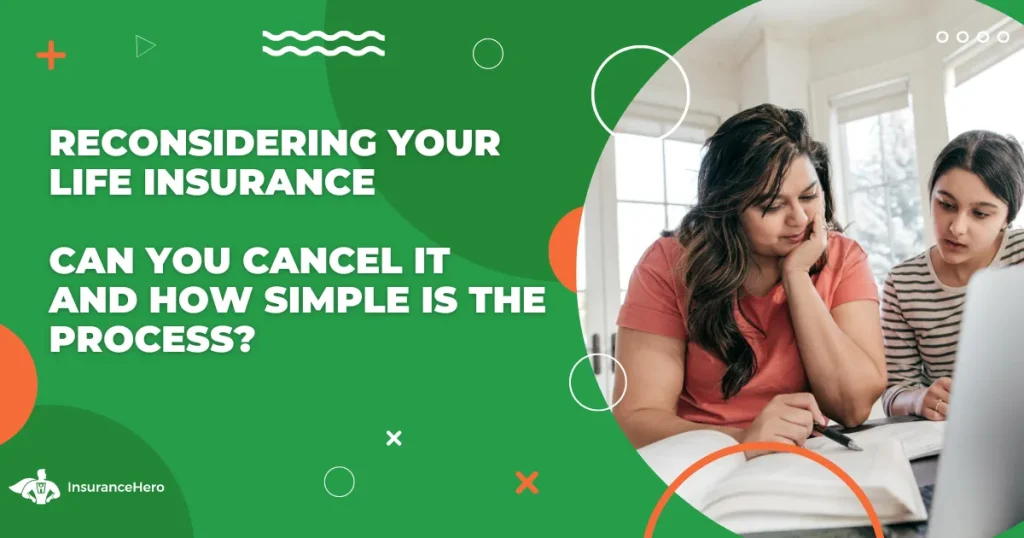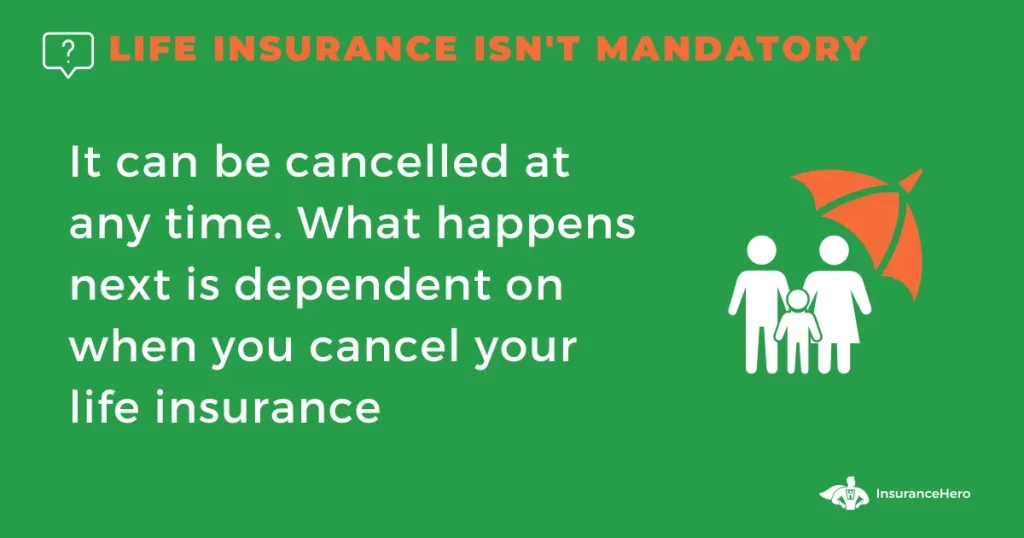Can You Cancel Your Life Insurance At Any Time?

Let’s start this article by quickly tackling the question at hand. Can you cancel your life insurance policy when you want?
The simple answer is yes; it’s perfectly reasonable to cancel when you want, and the process is relatively straightforward.
But if you remember when you initially signed up for your life insurance, it was likely a well-thought-out decision that wasn’t considered lightly. The same careful consideration should apply if you’re now contemplating cancellation.
Changes in financial or personal circumstances, or even the desire to switch providers for better terms, might prompt you to reevaluate your life insurance needs. But before making any adjustments, it is crucial to weigh the potential consequences.
So, we’ll discuss the steps to cancel your life insurance and give you some alternatives that could serve you better in the long run. Read on to find out more.
Can a Life Insurance Policy be Cancelled at Any Time?
Another question we’re often asked is whether you can cancel your life insurance policy at any time. The answer is yes, again.
The Cooling-Off Period
By law, an insurance company must give its policyholders a 14-day cooling-off period, though most providers will give you up to 30 days, sometimes longer.
It depends on the provider when this cooling-off window starts; it will be from the policy’s start date or when you get your welcome pack. This grace period allows you to change your mind and cancel your policy without incurring penalties.
Cancelling Within the Cooling-Off Period
If you’ve decided the policy isn’t for you during this cooling-off period and decide to cancel, you’ll receive a refund of the premiums you’ve paid. Your policy will be terminated without any further obligations.
Cancelling After the Cooling-Off Period
The most popular kind of life insurance in the UK is term life, which is a ‘pure protection’ policy that pays out a lump sum if you die during the term of the policy. This applies to level-term life, decreasing-term life and mortgage insurance.
If you cancel this type of ‘pure protection’ life insurance after the cooling-off period, you won’t get a refund of any premiums paid.
As unfair as it may seem, if you’ve been paying them consistently for two months or ten years, don’t anticipate receiving any returns.
If you have whole life insurance, i.e. one that provides you coverage for the entire duration of your life rather than a fixed term, you can still cancel it at any time, and you get the same cooling-off period as term life.
As whole life insurance policies often have an investment component that accumulates in step with your premiums, the cancellation process can be more complex than term life. It’s well worth checking with your provider or their terms and conditions before jumping the gun and cancelling.
There’s a good chance you’ll be entitled to some cash back, but if you cancel and cash out in the initial few years of your policy, the surrender value probably won’t match anywhere near what you paid in. Consider wisely before going ahead.

How To Cancel Your Life Insurance Policy
Let’s discuss the process of cancelling your life insurance, but before we do, we strongly advise you to read the entire guide.
It will just take a few minutes of your time. When making such a significant life decision, it’s best to be well-informed rather than forging ahead and doing something you might regret later.
First, let’s begin with what not to do—don’t cancel your standing order without telling your insurance company.
This is a big no-no, whatever you might read elsewhere. Sure, cancel the standing order with your bank for peace of mind, but you must let your insurer know that you no longer want to be insured first.
If you don’t, you might still accrue charges for something you no longer want.
It’s no hardship to cancel a policy anyway; every insurer will have details of the procedure on their website. It could start with a phone call, or you might have to complete an online form or send a letter. For instance, you can cancel your life insurance by post or phone call with Royal London.
Reasons For Cancelling Life Insurance
Lumping everyone together and saying this is why people cancel life insurance would be unfair, as the reasons are varied and personal.
But here are some of the most common reasons that we’ve seen:
A Change In Financial Situation
A common reason for individuals to consider cancelling their life insurance policy is affordability, as maintaining premium payments can be financially challenging over time.
When facing budget constraints, evaluating personal priorities and life insurance protection is crucial, especially for those with dependents, mortgages or outstanding debts.
Before cancelling a policy due to affordability, policyholders should explore options for lowering their premiums without relinquishing their insurance coverage.
One potential solution is to adjust the policy’s coverage amount or term length, which may result in lower premiums.
Another option is to speak with one of our friendly life insurance experts at Insurance Hero, who can offer guidance on finding an affordable policy that better meets the individual’s needs.
We may be able to suggest alternative insurance products that offer more competitive rates or better-suited coverage options.

A Change In Personal Circumstances
Another reason to cancel a life insurance policy is a change in personal circumstances. Life is unpredictable, and our needs and priorities evolve as we experience its different stages.
If the kids have flown the nest and are financially independent, your responsibilities lessen, as they are no longer dependent on your income.
Or if you’re about to retire and no longer need an insurance policy to pay off a mortgage or other debts, cancelling your life insurance might be a sensible option.
Divorce could also trigger the need for policy cancellation if you previously had a joint policy with your ex-partner. Of course, if you’re in this situation, you may want to consider taking out a new individual policy.
Dissatisfied with Current Life Insurance
It could be that someone is unhappy with their existing plan, rather than a case of no longer requiring life insurance.
This dissatisfaction can stem from several factors, such as inadequate customer service, limited coverage options, or high premium rates.
If this is the case for you, hold fire before cancelling and research and secure a new life insurance plan first.
You can compare quotes for free with no obligation with Insurance Hero or talk to one of our team to discuss the right coverage for you.
Implications And Considerations Before Cancelling Life Insurance
As we have tried to emphasise, you can’t cancel life insurance without due consideration.
Cancellation should be considered a last resort only if necessary, not as a way of freeing up money for less essential purposes.
We understand why people might consider cancelling life insurance, but we also urge caution.
Impact On Beneficiaries
Taking out life insurance is a genuinely selfless move – you are protecting the financial security of your loved ones and beneficiaries in the event of your death.
Our intent isn’t to put you on the spot or make you feel guilty, but what happens if you cancel that life insurance and then, tragically, something does happen to you?
You probably don’t want to dwell on it, but even if you have to reduce your premiums or change to a cheaper plan, it’s far better than no protection.
Cost Implications of Cancelling and Reapplying
The reality is that once you cancel your life insurance plan, you can usually not get it back without taking out another plan.
Time doesn’t stand still, nor does the cost of insurance policies. If, down the line, you want to reapply for a new plan, keep in mind you’ll be older, your health status may have changed for the worse, and the insurance market will have changed too.
This could mean that a new policy may be more expensive or even unavailable due to changes in your health or age.
Alternatives To Cancelling Life Insurance
Life insurance is never the cheeriest of subjects, though it’s one we all have to face up to at some point. But here, we offer some light at the end of the tunnel with solutions to help you get out of your cancellation bind.
Adjust Your Payments
If you want to keep your existing policy but struggle to meet the payments, speak to your insurer. They might be able to lower the monthly payment, so the death benefit will be a lesser amount but still offer some financial protection to your dependents.
Or you could increase the term of your policy to reduce the payments.
Switch Plans
Your policy isn’t the only life insurance plan in town. Fortunately, in today’s fast-paced and undeniably convenient digital world, there are comparison sites such as Insurance Hero where you can compare life insurance plans in a few easy clicks.
Switching to a more affordable plan could answer your life insurance concerns.
Be Proactive and Adjust Your Lifestyle
If all else fails, taking control of your financial future by making a few lifestyle changes could be the solution.
Adjusting your budget is never easy, but is there some non-essential spending that you can cut back on that when weighed against the value of life insurance, could balance life insurance costs?
Get Free Advice
If you are still in somewhat of a dilemma and aren’t sure what to do, Insurance Hero can help. We provide free, no-obligation advice from finance professionals who will be able to advise you on the best way forward.
Our advisors work in your interests and have access to life insurance plans from various providers. Contact us today.
Policy Lapse vs Cancelled Life Insurance
Let’s finish by looking at lapsed policies and how they differ from cancelled ones. Failure to pay your monthly premiums will cause your plan to lapse, and your coverage will be temporarily suspended.
You’ll be given a grace period to reinstate your coverage; this might also involve additional fees as a penalty.
So, the primary difference between a lapsed policy and a cancelled policy lies in the potential to reinstate the coverage.
A lapsed policy may be reinstated, subject to certain conditions, while a cancelled policy requires applying for a new policy altogether.
Can You Cancel Your Life Insurance Final Thoughts
Though cancelling a life Insurance policy is easy enough, this decision can also have long-lasting implications.
While it’s perfectly reasonable to reconsider your coverage due to changes in personal circumstances or financial situation, it’s essential to carefully weigh the potential consequences before making this critical decision.
There are viable alternatives to cancellation that can help you maintain the vital protection life insurance offers.
At Insurance Hero, we are not under any illusions that the decision to cancel is easy. But we do have the experience to help, regardless of your unique situation. If you have already made your mind up and wish to cancel, it might be worth considering alternatives to life insurance cover.
CALL OUR FRIENDLY TEAM ON 0203 129 88 66
FAQs
If I cancel my life insurance, will it impact my credit rating?
No, there’s no correlation between cancelling a life insurance policy and your credit rating, as you aren’t borrowing any money when you take out a life insurance policy.
Can I pause my life insurance policy?
Some insurers may allow you to temporarily suspend your life insurance cover while you cannot make payments – although this isn’t always the case.
Can an insurance provider cancel my policy?
Yes, cancellation goes both ways; they can cancel your policy if you’ve got behind on payment or if they are under the impression that the information you gave them when taking out the policy is false.
Steve Case is a seasoned professional in the UK financial services and insurance industry, with over twenty years of experience. At Insurance Hero, Steve is known for his ability to simplify complex insurance topics, making them accessible to a broad audience. His focus on clear, practical advice and customer service excellence has established him as a respected leader in the field.


